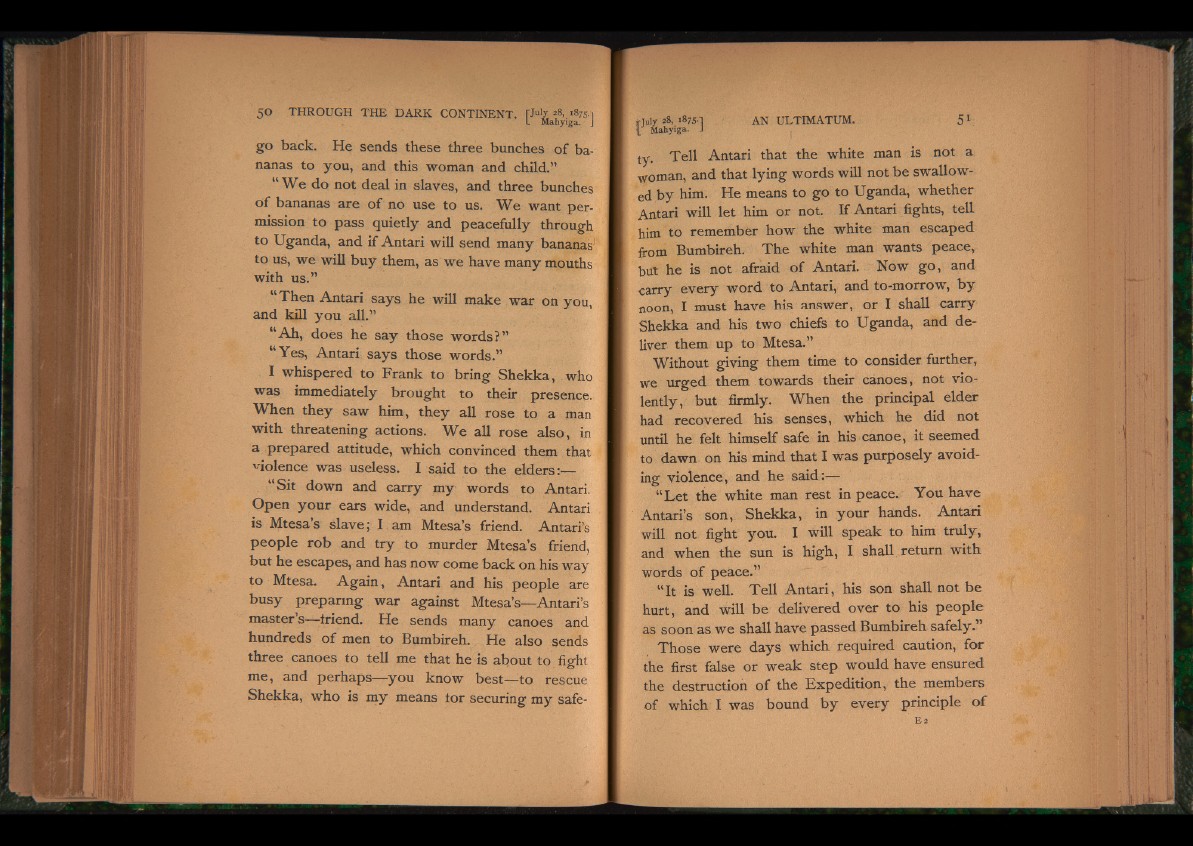
g o back. He sends these three bunches o f bananas
to you, and this woman and child.”
“ W e do not deal in slaves, and three bunches
o f bananas are o f no use to us. "We want permission
to pass quietly and peacefully through
to Uganda, and if Antari will send many bananas1
to us, w e will buy them, as we have many mouths
with us.”
Then Antari says he will make war on you,
and kill yo u all.”
“ Ah, does he sa y those words?”
“ Yes, Antari says those words.”
I whispered to Frank to bring Sh ekk a, who
was immediately brought to their presence.
When th ey saw him, th e y all rose to a man
with threatening actions. W e all rose also, in
a prepared attitude, which convinced them that
violence was useless. I said to the elders:—
“ Sit down and carry my words to Antari,
Open y o u r ears wide, and understand. Antari
is Mtesa’s slave; I am Mtesa’s friend. Antari’s
people rob and try to murder Mtesa’s friend,
but he escapes, and has now come back on his way
to Mtesa. A g a in , Antari and his people are
b u sy preparing war against Mtesa’s— Antari’s
master s— iriend. He sends many canoes and
hundreds o f men to Bumbireh. He also sends
three canoes to tell me that he is at>out to fight
me, and perhaps— yo u know best— to rescue
Shekka, who is my means tor securing my safety.
T e ll Antari that the white man is not a
woman, and that lying words will not be swallowed
b y him. He means to go to Uganda, whether
Antari will let him or not. If Antari fights, tell
him to remember how the white man escaped
from Bumbireh. T h e white man wants peace,
but he is not afraid o f Antari. Now g o , and
carry every word to Antari, and to-morrow, b y
noon, I must have his answer, or I shall carry
Shekka and his two chiefs to Uganda, and deliver
them up to Mtesa.”
Without giving them time to consider further,
we urged diem towards their canoes, not v io lently
, but firmly. When the principal elder
had recovered his senses, which he did not
until he felt himself safe in his canoe, it seemed
to dawn on his mind that I was purposely avoiding
violence, and he said:—
“ L e t the white man rest in peace. Y o u have
Antari’s son, Shekka, in your hands. Antari
will not fight you. I will speak to him truly,
and when the sun is high, I shall return with
words o f peace.”
“ It is well. T e ll Antari, his son shall not be
hurt, and will be delivered over to his people
as soon as we shall have passed Bumbireh safely.”
Those were days which required caution, for
the first false or weak step would have ensured
the destruction o f the Expedition, the members
o f which I was bound b y e v e ry principle o f